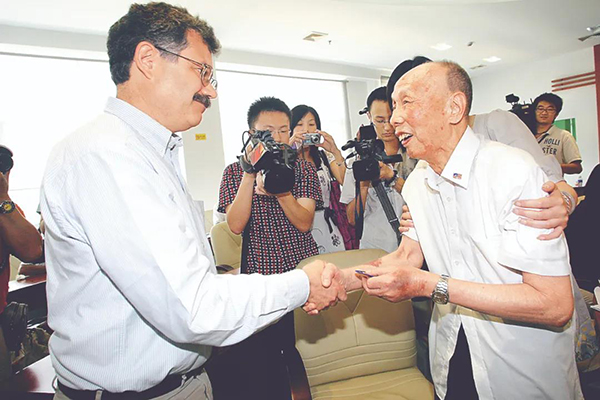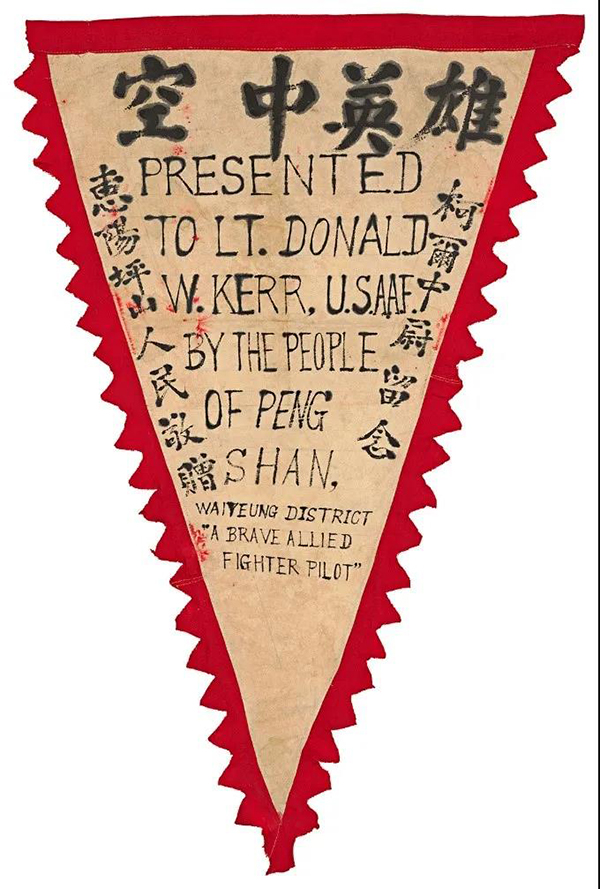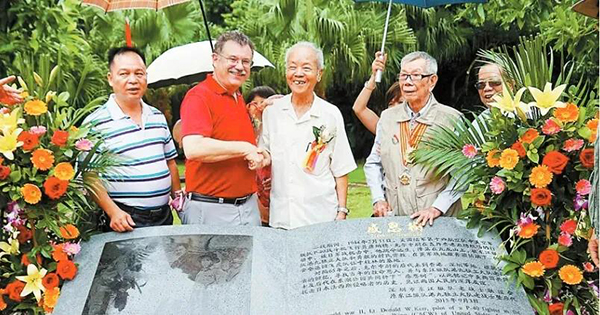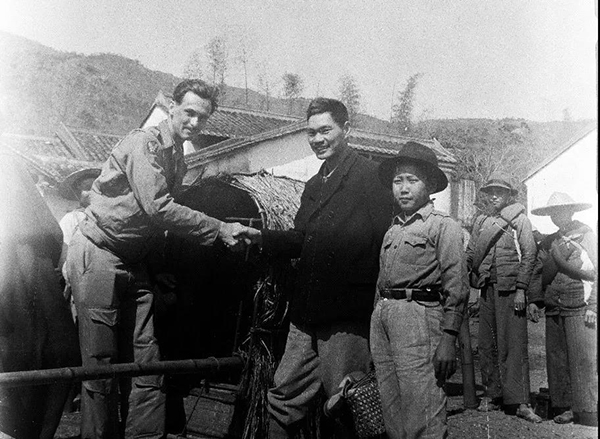
Flying Tiger family’s bond
with Shenzhen continues to thrive
When 「Flying Tiger」 Lieutenant Donald W. Kerr was rescued by the Dongjiang Column guerillas during World War II to a safe place in what would become Shenzhen decades later, he unknowingly started his family’s bond with the city that has lasted for 77 years.
「二戰」期間,當美國「飛虎隊」中尉唐納德·克爾被廣東人民抗日游擊隊東江縱隊解救,安全抵達數十年後被稱為深圳的這片土地上時,他不曾想到,從此他的家族與這座城市的牽絆會延續77年。
And that bond still shows no sign of withering. His second son, David Kerr, said on March 18 during a video interview with Shenzhen Daily that he is planning to visit Shenzhen again as soon as the COVID-19 pandemic dies down. 「I will come back as soon as travel is possible. I can’t wait !」
而且,時至今日,這樣的牽絆依然沒有淡去。克爾中尉的二子戴維·克爾上周四在接受英文《深圳日報》記者視頻連線採訪時表示,一旦新冠疫情平息,他將再次來訪深圳。「國際旅行一旦恢復正常我就會回來。我已經迫不及待了!」
David and his family traveled to Shenzhen in 2008 to say thank you to the veterans of the CPC-led Dongjiang Column, also known as East River Column, who saved his father, a U.S. air force pilot helping China fight Japanese invaders. Lt. Kerr was grateful for his association with the Chinese people — first in the air as fellow pilots and later on the ground as courageous rescuers, according to his journal. David took great pains to locate the veterans and their families to fulfill a lifelong dream of his father: a journey of gratitude.
2008年,戴維及其家人不遠千里來到深圳,當面向東江縱隊的老兵表達感謝,開啟了克爾家族的感恩之旅。老兵們曾經營救了他的父親——一位協同中國抗擊日本侵略者的美國空軍飛行員。據克爾中尉的日記記載,他對先是在空中並肩作戰,後來在陸上被游擊隊英勇營救的這段與中國人民的交往經歷心存感激。就這樣,多年來戴維不辭辛勞地找尋老兵們及其家人,以實現父親一生未竟的夢想——一次感恩之旅。

David Kerr (L) presents a Flying Tigers badge to Deng Bin, one of the two guerillas who brought Lt. Kerr from Hong Kong to Shenzhen, during David’s journey of gratitude to Shenzhen in 2008. Cheng Haikun
Epic rescue 「史詩大營救」
On Feb. 11, 1944, Lt. Kerr was on a mission to bomb Hong Kong’s Kai-Tak airport, which had become an airbase of the Japanese invaders. After he shot down a Japanese plane, three enemy planes attacked. Kerr’s aircraft was hit and caught fire. He had to eject from the burning aircraft, according to Lt. Kerr’s memoir.
1944年2月11日,克爾中尉執行轟炸當時已成為侵華日軍空軍基地的香港啟德機場的任務。在其擊落一架日本戰機後,三架敵機發動反擊;不幸的是,克爾座機被擊中,隨後機身起火。克爾在回憶錄中寫道:面對這樣的情況,他不得不跳傘求生。
The memoir is believed to have been written in the days immediately following the pilot’s rescue. It was first discovered by his family in 1982, five years after his death at the age of 62.
這本回憶錄據信是在克爾獲救後的幾天內寫成的。1977年,克爾去世,5年後,他的家人發現了這本回憶錄。

A banner praising Lt. Kerr as “a brave allied fighter pilot” presented in 1944 by people of Huiyang District’s Pingshan, which is part of today’s Shenzhen. Courtesy of David Kerr
While parachuting, Lt. Kerr, then in his 30s, lost hope when he saw Japanese soldiers cheering on the ground, waiting to capture him. Fortunately, the wind blew him to a hill in Sha Tin and he was saved by a 14-year-old Dongjiang Column soldier, Li Shi. Li and other guerillas hid the injured pilot in various places, including a cave in a mountain where he spent nearly two weeks protected by five guerrillas around the clock. Upon hearing of Lt. Kerr’s situation, Zeng Sheng, commander of the column, decided to bring him out of the Japanese-occupied areas at whatever cost. The commander organized the audacious rescue that involved attacks on the Kai-Tak airport and other enemy strongholds to distract the Japanese forces who were desperately searching for Lt. Kerr.
根據其回憶錄,時年30多歲的克爾在跳傘時,看到地面上歡呼着等待抓捕他的日本士兵,他一度失去了希望。但幸運的是,風把他吹到了位於香港沙田的一個小山坡上,隨後他被時年14歲的東江縱隊隊員李石救了下來。為了安全,李石和其他縱隊隊員將克爾在數個不同地點間轉移,其中還包括一個山洞。克爾在五個縱隊隊員的晝夜保護下在山洞裏度過了近兩個星期。縱隊司令員曾生聽聞克爾的情況後,決定不惜一切代價將他带出日佔區。曾生隨後組織了英勇的營救行動,其中包括對啟德機場和其他日軍據點的襲擊,以分散正在拼命搜尋克爾的日軍。
Lt. Kerr arrived in Nan’ao on a boat and for a few days stayed in Tuyang, where the column was headquartered, before embarking on a 10-day journey to his base in Guilin, Guangxi.
克爾隨後乘船抵達南澳,在縱隊總部所在地、如今深圳大鵬的土洋住了幾天,之後踏上了前往廣西桂林美軍空軍基地的10天路程。
Lt. Kerr’s rescue was chronicled by “Take Me Home,” a documentary movie that premiered in 2015. It was also featured in several books.
2015年首映的紀錄片《營救克爾》紀錄了這段歷史。同時,這次大營救也被收錄在多本書籍中。
SZ’s frequent guest
來訪深圳的常客
David Kerr talks about visits to Dongjiang families.
Since the 2008 journey of gratitude, David Kerr has visited Shenzhen twice a year — except in 2020 when the pandemic made international travel almost impossible. David’s elder brother, Andy, also visited Shenzhen several times.
2008年的「感恩之旅」以來,除了去年的疫情緣故,戴維每年都會到訪深圳兩次。戴維的哥哥安迪也曾多次到訪深圳。
「I had the privilege of becoming friends with Deng Bin’s (one of the guerillas) family and the families of other old soldiers and their families in Shenzhen. I have visited with them almost every year since 2008,」David told Shenzhen Daily.
「我有幸與鄧斌(前縱隊隊員)的家人以及居住在深圳的其他老兵的家人成為朋友。從2008年開始,我幾乎每年都會去看望他們。」戴維對記者說道。
「In 2015, my brother, Andy Kerr, and I worked with Deng Bin’s son, Deng Liping, to create a video that he sponsored commemorating his father’s work in the East River Column during the war, including the rescue of Lt. Kerr,」he added.
「2015年,我和哥哥安迪與鄧斌之子鄧力平合作,製作了一部講述鄧斌在東江縱隊經歷的紀念視頻,其中就包括援救我父親的經歷。」戴維講說。

David Kerr (2nd L) poses for a photo with the veteran warriors of the Dongjiang Column and their families at the unveiling ceremony of a monument standing beside the two trees of gratitude planted by Kerr during his visit to Shenzhen in 2008 at Donghu Park in Luohu District on August 30, 2015. File photo
David said whenever he was in Shenzhen, he would meet Jiang Shan, son of Li Siu-wah who was very important to the rescue of his father. 「As often as possible, I meet with Chen Xiaoyan, the daughter of a small boy who escorted my father through much of his escape,」 he said.
戴維說,每次到訪深圳,他都會去面見江山,他是對營救其父起了重要作用的李兆華之子。「我也盡可能多地與陳小燕見面,她是當時護送我父親完成了大部分逃亡路程的一位縱隊隊員之女。」
On several occasions David also met Zeng Kaiping, the third son of Commander Zeng.
戴維還多次面見了曾生的三子曾凱平。
「There are many ties between the East River family and the Kerr family. I am very happy to have such an extended family,」David said.
「東江縱隊後人和我們家族之間有很多剪不斷的聯結。我很高興有這樣一個大家庭。」戴維表示。
Unfortunately almost all the old soldiers have died, including almost all veterans he met in 2008, he said. 「So both the East River descendants and the Kerr family descendants feel important to keep that memory alive, to remember that time, 75 [77] years ago, when our parents got together and did a very great thing to help defeat our common enemy,」David added.
戴維說,遺憾的是,如今幾乎所有當時參與營救的老兵都去世了,包括他在2008年見過的老兵。「所以,縱隊的後人和我家族的後人都覺得留存這樣的記憶很重要,要記住77年前的那段時光。當時我們的父輩通力協作,完成了一件非常偉大的事,最終擊敗了我們共同的敵人。」戴維補充道。
Generational warmth
代代相傳的深情厚誼
Andy talks about his father's warmth towards Chinese people and warmth from Dongjiang families.
David’s elder brother, Andy, also traveled to Shenzhen in 2009, 2014 and 2015. 「It was fascinating to meet these people (the rescuers) and their children and grandchildren,」Andy told Shenzhen Daily on March 19 via video link. Andy’s wife and daughters also came with him in 2015, meeting many people in “celebratory” atmospheres.
戴維的哥哥安迪也曾在2009年、2014年和2015年到訪深圳。「能見到這些人(指營救其父者)與他們的後人,我真的很興奮。」安迪上周五在視頻連線採訪中對英文《深圳日報》記者表示。2015年,安迪的妻子和女兒也一同前來,見到了許多救父者的後人。「當時洋溢着慶祝的氣氛。」戴維形容。
Today the Kerr family still has strong gratitude towards the guerillas. Andy said he recently learned of the complex issues regarding planning and executing the rescue, such as keeping the operation secret. “There were so many levels of difficulties they (the guerillas) had to overcome,” he said, adding the Kerr family is “eternally grateful” for the rescuers.
如今,克爾家族對縱隊的感激之情依然強烈。安迪說,他最近才了解到關於救援計劃和營救行動的複雜性,比如需要做好保密工作。「他們(縱隊隊員)要克服的困難太多了,我們對營救隊員永遠充滿感激。」
Andy said the descendants of his father’s rescuers seemed to remember Lt. Kerr’s warm attitude towards Chinese people. “His attitude and warmth to Chinese people in general was passed down … and there was warmth that we felt from the relatives and descendants that was very noticeable. And I went away very touched after that,” Andy recalled of his family’s meeting with the Dongjiang descendants.
安迪表示,營救隊員的後人們談起父親對中國人民的友好態度,都歷歷在目。安迪在回憶起全家與東江縱隊後人見面的情景時說道:「我父親對中國人民的深情厚誼被流傳了下來……我們也從營救隊員家屬和後人那裏感受到非常深厚的人性溫暖。離開深圳時我非常感動。」
SZ, a showcase for China
深圳,一城展現中國繁榮
David talks about Shenzhen.
David sent a photo of his father thanking Commander Zeng to Shenzhen Daily via email. “The photo was taken in Shenzhen. I am happy that my father felt safe when he got to Shenzhen, and I am happy to see how dynamic the city is today. The people of Shenzhen should be very proud of how the city has grown and prospered.”
戴維通過郵件向記者發來了父親當面感謝縱隊司令員曾生的舊照片。「這張照片是在深圳拍攝的。父親到了深圳後感到很安心,我也很高興看到這個城市如今的十足活力。深圳人民應該為這座城市的發展和繁榮感到十分自豪。」

Lt. Donald Kerr (L) thanks Zeng Sheng (C), Dongjiang Column commander, for rescuing him in 1944.
He said his father would be “very surprised and very happy” if Lt. Kerr were able to see Shenzhen today. “When he came to Shenzhen in 1944, it was a collection of small fishing villages … maybe about 8,000 people. And now 20 million. A real showcase for China.”
他說,如果父親能夠看到深圳今日的樣貌,應該會感覺非常驚喜。「1944年,當他在深圳時,這裏還是一片散落着小漁村的地域……也許只有大約8000人在此生活,而現在大約有2000萬人。這座城市的確是中國的展示窗口。」
Shenzhen was the first Chinese city David visited. As an employee of Lenovo U.S. in 2005, he arrived in Shenzhen from Hong Kong at night. When he woke up the next morning, he saw “a huge city spreading in front of me.” Shenzhen is “a city absolutely full of life, everyone very optimistic about the future,” he said. “Everyone driving forward, to make the city great, and to make their careers great.”
深圳是戴維到訪的第一個中國城市。2005年,作為聯想公司的員工,他在一個夜晚自香港到達深圳。戴維說,第二天早上醒來時,他見到 「一個宏大雄偉的城市」 展現在他面前。「深圳是一個充滿生機的城市,大家對未來非常樂觀。」他說。每個人都在向前奮進,讓這個城市變得更好,也讓自己的事業發展得更好。
More exchange urged
戴維:中美人民需要常交流,國際合作十分重要
In David’s opinion, American people and Chinese people need to visit each other.「People in the United States who’ve not been to China have an impression from television shows and movies from a hundred years ago: everyone bicycles and works in fields. And I tell them, China is not what you are going to expect. You need to come to China and see for yourself the great progress the country has made,」 David said.
在戴維看來,美國人民和中國人民需要擴大互相交往。「沒有來過中國的美國人,對中國的印象來自於多年前的電視劇和電影:中國人都騎着自行車,或在田地裏務農。而我告訴他們,中國並不是你所想的那樣。你們要親自來中國,親眼看看中國所取得的巨大成就。」戴維說道。
「I think the Chinese people and American people have great respect to each other, and I really want to encourage that American people visit Chinese people, and Chinese people come here and visit. When you show your country to somebody else you really start to understand how many commonalities [there are] between the Chinese people and American people.」
「我認為中美兩國人民是相互尊重的,我很想鼓勵兩國人民到對方的國家看看。當你向他人展示你的國家時,你就會真正開始理解兩國人民之間有多少共同點(存在)。」
In his opinion, international cooperation — which led to Lt. Kerr’s military service in China and his rescue — remains important today. “From a personal perspective, I always tell people: remember how cooperation has helped us in the past and let’s make Shenzhen a world city, where you bring in the strength of all countries, put them together and become a world-class city. I really think Shenzhen has become that in amazingly fast time,” he added.
國際合作使克爾中尉來到中國協同作戰,也使他在危難之際獲救。在戴維看來,國際合作如今仍然很重要。「從個人的角度,我經常對他人講:記住過去這段合作經歷對我們的帮助;讓我們集合全世界的力量,把深圳打造成為世界一流的城市。我認為深圳已經以驚人的速度發展成為這樣的城市。」他補充道。




